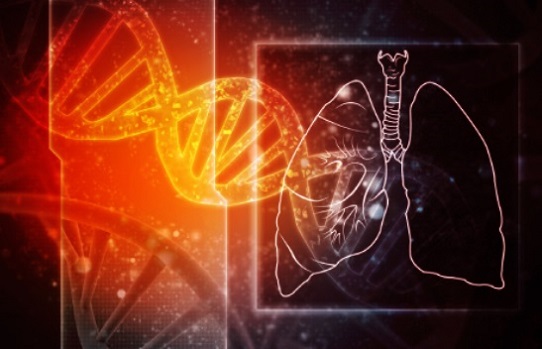Inflammation in the Lungs Triggers Dangerous Epigenetic Shifts That May Lead to Lung Cancer
Nikhil Prasad Fact checked by:Thailand Medical News Team May 17, 2025 9 months, 1 week, 1 day, 53 minutes ago
Medical News: Inflammation’s Hidden Impact on Lung Cells Uncovered in Groundbreaking Murine Study
A new study led by researchers from the University of Minnesota has revealed how chronic inflammation in the lungs can quietly alter the genetic landscape of key lung cells, potentially setting the stage for the development of lung cancer. The research, conducted using a mouse model, focused on alveolar Type II epithelial cells—cells crucial to lung function and also the preferred targets of SARS-CoV-2. These cells are known to play a critical role in repairing damaged lung tissue, but under inflammatory stress, they may undergo harmful genetic and molecular changes.
 Inflammation in the Lungs Triggers Dangerous Epigenetic Shifts That May Lead to Lung Cancer
Inflammation in the Lungs Triggers Dangerous Epigenetic Shifts That May Lead to Lung Cancer
This
Medical News report explores how inflammation—specifically from exposure to lipopolysaccharide (LPS), a toxic component of certain bacteria and a substance found in cigarette smoke—leads to epigenetic changes that disturb normal gene expression. The study aimed to mimic the effects of chronic lung inflammation seen in conditions like long COVID, asthma, and chronic obstructive pulmonary disease (COPD), which are also recognized as risk factors for lung cancer.
The Experiment Setup and Why It Matters
In the study, male and female A/J mice were exposed to LPS through intranasal delivery over a three-week period. The researchers then analyzed the alveolar Type II cells using advanced “multi-omics” tools that included genome-wide assessments of DNA methylation (a form of epigenetic regulation), gene expression, and protein abundance.
Interestingly, the study found that although the overall level of DNA methylation remained steady, there was a significant drop in DNA hydroxymethylation—a key regulatory mechanism—in the lung cells of mice exposed to LPS. These changes were especially persistent in female mice even after a four-week recovery period, suggesting potential long-term or sex-specific vulnerabilities to inflammation.
Epigenetic Changes That Could Set the Stage for Lung Cancer
One of the major discoveries in the study was that LPS exposure led to widespread changes in specific regions of the genome—particularly at enhancer-like regulatory sites. These regions help control which genes are turned on or off, and modifications here can have major consequences for cell behavior. More than 6,000 methylation and hydroxymethylation changes were detected, with many of these located near genes tied to lung tissue development, structure, and even tumor formation.
Notably, the transcription factor Etv5, a gene regulator essential for maintaining healthy lung cells, was found to be heavily affected by these epigenetic shifts. The researchers observed reduced expression of Etv5 and several of its downstream targets. Since Etv5 is known to play a role in preventing cancer, its disruption by inflammation may be an early warning sign of cancer risk.
trong>Gene and Protein Changes Reflect an Inflammatory and Oncogenic Pattern
In tandem with the epigenetic findings, RNA sequencing revealed nearly 1,800 genes with altered activity following LPS exposure. Many of these were pro-inflammatory genes such as cytokines and chemokines, which are commonly involved in the body’s immune response but can also promote cancer if their signaling becomes chronic.
On the protein level, mass spectrometry analysis identified over 150 proteins with altered expression. Many of the increased proteins were involved in immune system activity, while several decreased proteins were known tumor suppressors. Alarmingly, 59 cancer-promoting proteins (oncogenes) were found in higher quantities, while tumor suppressors were diminished. This reinforces the idea that inflammation could be laying the groundwork for cancer development at both the genetic and protein levels.
How Long Do These Changes Last
Another vital part of the study examined whether the inflammatory changes could reverse once LPS exposure stopped. Encouragingly, 98% of the gene expression changes returned to normal after a four-week recovery. However, some changes—particularly in DNA hydroxymethylation in female mice and specific cancer-related genes—remained altered. This highlights that while the body has some resilience, not all damage may be fully reversible, especially in females.
Implications for Lung Disease and Cancer Prevention
The researchers emphasized that these findings offer a critical warning about the underestimated dangers of chronic inflammation in the lungs. Whether from air pollution, cigarette smoke, infections like COVID-19, or bacterial exposure, repeated inflammation could initiate silent but dangerous changes in lung cells. These epigenetic alterations may not cause immediate symptoms but could set the stage for cancer years later.
The study also opens up potential new therapeutic avenues. By targeting specific epigenetic changes or enhancing the activity of protective genes like Etv5, scientists may be able to develop strategies to prevent lung cancer in individuals at high risk due to chronic inflammation.
These discoveries provide strong evidence that inflammation does more than just irritate the lungs—it rewires them on a molecular level. As more is learned about these processes, especially their sex-specific differences, we may uncover crucial insights into how to better protect vulnerable populations from inflammation-driven diseases like cancer.
The study findings were published in the peer reviewed International Journal of Molecular Sciences.
https://www.mdpi.com/1422-0067/26/10/4692
For the latest Cancer News, keep on logging to Thailand Medical News.
Read Also:
https://www.thailandmedical.news/news/study-alarmingly-finds-that-ct-scans-are-possibly-triggering-the-onset-of-cancers
https://www.thailandmedical.news/news/lithium-chloride-shows-surprising-ability-to-block-inflammatory-damage-from-covid-19-spike-protein-in-lung-cancer-cells
https://www.thailandmedical.news/news/an-introduction-to-mirtrons-the-tiny-rna-molecules-that-play-a-role-in-cancer
https://www.thailandmedical.news/articles/cancer
https://www.thailandmedical.news/pages/thailand_doctors_listings
